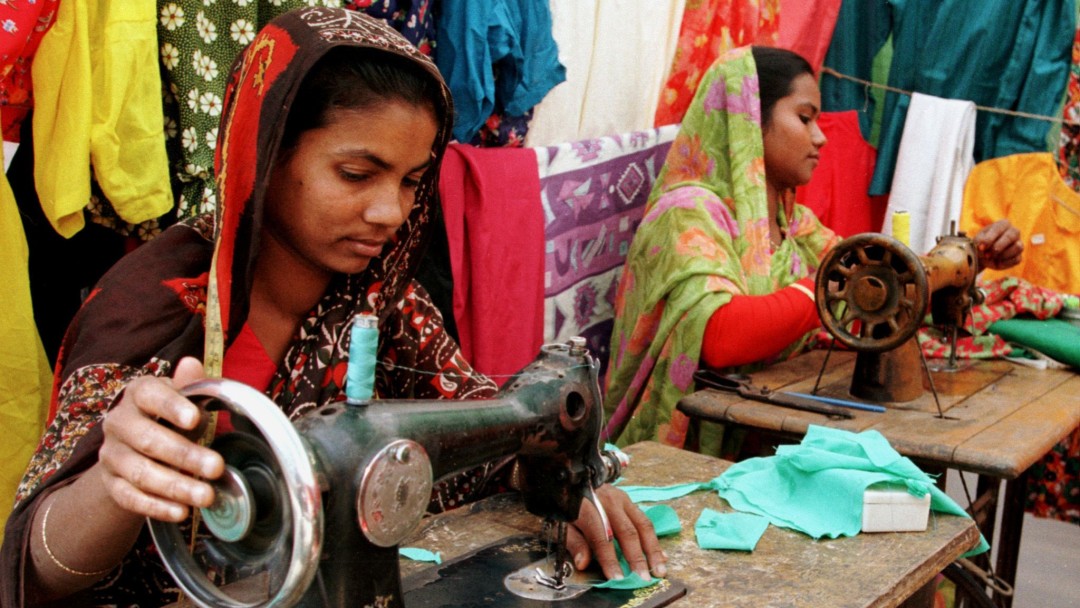News from 2015-03-05 / KfW Development Bank
Better opportunities for women in Bangladesh
International Women’s Day: new markets and shops support the cause of gender equality
In the morning, when she opens her shop, Minotee begins her day’s work by brushing the dust off her stock. The retailer from Bangladesh sells tea, soap, biscuits and much more besides. She just opened her store very recently – and was only able to do so in the first place because she received funding from the "Rural Infrastructure Improvement Program" (RIIP). "Helping women in rural regions to become more financially independent is an important part of this project," explains Johannes Scholl, a project manager at KfW. It is for this precise purpose that newly established markets feature "women’s market sections", for example, where the stalls are reserved for female retailers. Women also attend business management and marketing courses, which enable them to sell their wares better and thus generate a higher income.
The programme in Bangladesh is just one example of how the projects that KfW Development Bank promotes contribute to the cause of gender equality. On International Women’s Day (8 March), KfW Development Bank is particularly keen to point out that almost half of the 357 projects it committed to in 2014 on behalf of the German Federal Government promote and strengthen the cause of gender equality. Roughly 25 % of new commitments – around EUR 1.8 billion – explicitly help to improve equality around the world.
Progress in gender equality
The South Asian country of Bangladesh has made fantastic progress with regard to gender equality, education, health and women’s economic participation. Yet women often still suffer discrimination in rural regions. The traditional allocation of roles means that they have fewer opportunities to become economically active and are therefore particularly liable to fall beneath the poverty line. The "Rural Infrastructure Improvement Program" (RIIP), which the German Federal Government has been supporting for eleven years now, provides assistance in rural regions with a view to improving infrastructure, setting up growth centres and equipping Bangladesh for climate change. Through KfW, Germany is providing EUR 46.5 million to build streets and markets, while other German funds are being pledged through the Deutsche Gesellschaft für internationale Zusammenarbeit (GIZ). The Asian Development Bank is also involved in the project.
The programme especially takes poor women and their needs into account. It has already benefited hundreds of women, just like Minotee, who talks about her experiences in a video. The courses, where women learn more about product selection, marketing and competitiveness, are particularly having an impact – the companies are sustainable. A project appraisal revealed that two thirds of the entrepreneurs who received funding are running their shops successfully and profitably, even several years after opening.
Streets are being built by women
Indeed, female workers are being employed to build streets too – planting flowers in roadside ditches or filling potholes. "The work not only allows women to make a living, but also to take better care of both themselves and their families," explains Mr Scholl. Often, the women invest the money they save back into agriculture.
Other women benefit from the streets too. In a survey, 73 % of women in the project area stated that the better transport routes mean they travel more often, with many of them doing so to drum up trade. Greater mobility is also important for social participation. According to a study conducted by the World Bank, in Bangladesh, women who leave their homes to work are more self-assured and are more likely to stand for office in politics.
This much is already clear at the local level. Women’s involvement in local administrations is being promoted by incentive systems; meanwhile, the owners of stores based in "women’s market sections" are becoming involved in independently organised market management committees. "In these committees, men and women are increasingly making decisions together," Mr Scholl emphasises.


Share page
To share the content of this page with your network, click on one of the icons below.
Note on data protection: When you share content, your personal data is transferred to the selected network.
Data protection
Alternatively, you can also copy the short link: https://www.kfw-entwicklungsbank.de/s/enzBWrMC.BAfA
Copy link Link copied